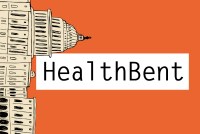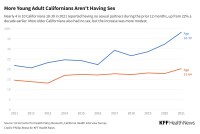Latest KFF Health News Stories
What the Health? From KFF Health News: When an Anti-Vaccine Activist Runs for President
Robert F. Kennedy Jr.’s official entry into the presidential race poses a thorny challenge for journalists: how to cover a candidate who’s opposed to vaccines without amplifying misinformation. And South Carolina becomes the latest state in the South to ban abortion after roughly six weeks of pregnancy. Alice Miranda Ollstein of Politico, Rachel Cohrs of Stat, and Sarah Karlin-Smith of the Pink Sheet join KFF Health News chief Washington correspondent Julie Rovner to discuss these issues and more. Also this week, Rovner interviews KFF Health News senior correspondent Aneri Pattani about her project to track the billions of dollars coming from opioid makers to settle lawsuits.
This Panel Will Decide Whose Medicine to Make Affordable. Its Choice Will Be Tricky.
Colorado’s new Prescription Drug Affordability Board could cap what health plans and consumers pay for certain medications starting next year. The process will pit patient groups against one another.
A Trans Teen No Longer Feels Welcome in Florida. So She Left.
Josie sensed Florida lawmakers were threatening her health care and ability to be herself at school. So she left. Families of other trans youth are plotting exits as well.
California Hospitals Seek a Broad Bailout, but They Don’t All Need It
As hospitals squeeze Democratic leaders in Sacramento for more money, health care finance experts and former state officials warn against falling for the industry’s fear tactics. They point to healthy profits and a recession-era financing scheme that allows rich hospitals to take tax money from poorer ones.
Abortion Bans Are Driving Off Doctors and Closing Clinics, Putting Basic Health Care at Risk
Doctors say they are reluctant to practice in abortion-banned states, where making the best decision for a patient could run afoul of the law. Even former President Donald Trump’s surgeon general is concerned about the repercussions for women’s health, writes KFF Health News’ chief Washington correspondent, Julie Rovner.
Domestic Violence Shelters Move Out of Hiding
A new domestic violence shelter in Bozeman, Montana, reflects efforts nationwide to rethink the model that keeps survivors of abuse in hiding. But there are no guidelines for bringing shelters out into the open, leaving each to make it up as they go.
As Water Levels Drop, the Risk of Arsenic Rises
As the West grapples with a megadrought, its driest spell in at least 1,200 years, rising levels of arsenic — a known carcinogen — in Colorado’s San Luis Valley offer clues to what the future may hold.
Small, Rural Communities Have Become Abortion Access Battlegrounds
After local leaders in rural Nevada reached an impasse over a proposed Planned Parenthood clinic, an anti-abortion activist pitching local abortion bans across the U.S. arrived at their remote City Hall.
California’s Fentanyl Problem Is Getting Worse
State lawmakers have recently been debating whether and how to stiffen punishments for dealers, while Gov. Gavin Newsom is targeting fentanyl trafficking and distributing more naloxone. The problem, experts say, is one with no easy or clear answers.
He Returned to the US for His Daughter’s Wedding. He Left With a $42,000 Hospital Bill.
After emergency surgery, an American expatriate with Swiss insurance now carries the baggage of a five-figure bill. Costs for medical care in the U.S. can be two to three times the rates in other developed countries, so foreigners and expats with good insurance in their home countries need travel insurance to protect themselves from “crazy prices.”
Young People Are Having Less Sex Than Their Parents Did at Their Age. Researchers Explore Why.
The percentage of young adults not having sex was rising even before covid made dating harder. Data and research suggest economic precarity, technology, and the warping effects of porn on sexual attitudes may play a role.
A More Aggressive FTC Is Starting to Target Drug Mergers and Industry Middlemen
Industry analysts are skeptical that Federal Trade Commission Chair Lina Khan can win her first fight against a drug industry merger. It will be reviewed by a judge appointed by then-President Donald Trump.
Are US Prescription Drug Prices 10 Times Those of Other Nations? Only Sometimes
Sen. Bernie Sanders’ broad statement that some U.S. drug prices are 10 times those of other nations doesn’t paint the full picture. Studies we examined generally found that U.S. prices were two to four times those in other countries, not 10.
Remote Work: An Underestimated Benefit for Family Caregivers
The debate about whether employees should be required to return to the workplace has generally focused on commuting, convenience, and child care. A fourth C, caregiving, has rarely been mentioned.
When Older Parents Resist Help or Advice, Use These Tips to Cope
Dealing with a stubborn or resistant older parent can be a difficult problem for adult children. Family caregivers and professionals have some hard-won lessons on how to manage these evolving relationships.
What the Health? From KFF Health News: The Abortion Pill Goes Back to Court
A three-judge appeals court panel heard testimony this week about revoking the FDA’s 22-year-old approval of a key pill used in medication abortion and miscarriage management. The judges all have track records of siding with abortion foes. Meanwhile, as the standoff over raising the federal debt ceiling continues in Washington, a major sticking point is whether to impose work requirements on recipients of Medicaid coverage. Victoria Knight of Axios, Rachel Roubein of The Washington Post, and Sandhya Raman of CQ Roll Call join KFF Health News chief Washington correspondent Julie Rovner to discuss these issues and more.
Watch: 5th Circuit Judges Question Two-Decade-Old Approval of Abortion Pill
The 5th Circuit Court of Appeals in New Orleans heard oral arguments Wednesday in a case brought by conservative Christian abortion opponents seeking to revoke FDA approval of mifepristone, a medication used in more than half of abortions in the U.S.
Thousands Face Medicaid Whiplash in South Dakota and North Carolina
Thousands of South Dakotans are being knocked off Medicaid, only to be eligible to requalify several months later. Even more enrollees are likely to experience a temporary loss of coverage in North Carolina.
A Covid Test Medicare Scam May Be a Trial Run for Further Fraud
Before the covid-19 public health emergency ended, Medicare advocates around the country noticed a rise in complaints from beneficiaries who received at-home covid tests they never requested. Bad actors may have used seniors’ Medicare information to improperly bill the federal government — and could do it again, say federal investigators.
Lawyer Fees Draw Scrutiny as Camp Lejeune Claims Stack Up
The Camp Lejeune Justice Act, which became law last year, created a pathway for veterans and their families to pursue damage claims against the government for toxic exposure at the military base. Now, advocates and lawmakers worry high lawyer fees could shortchange those injured.

























